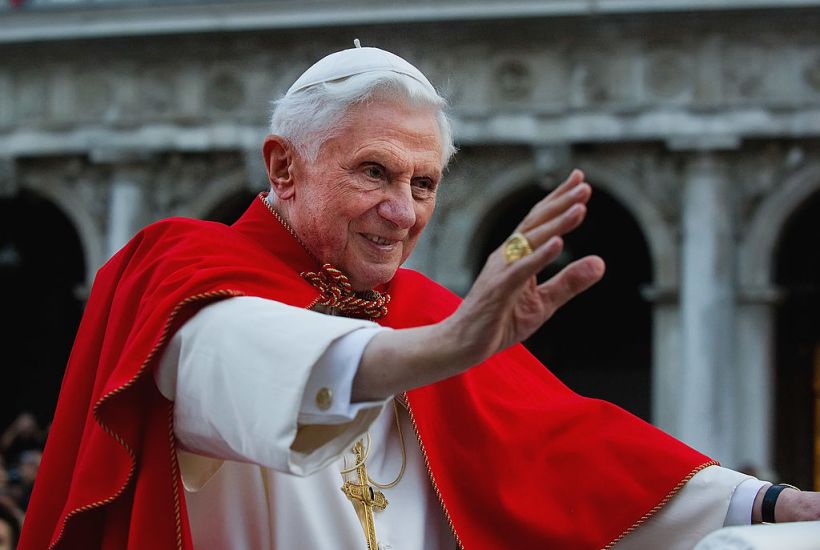It was Benedict XVI’s election as Pope, his speeches and his writings that prompted my conversion, and it was his words at Bellahouston Park during his 2010 visit to the United Kingdom that first made me seriously consider my vocation. Without Pope Benedict XVI I would not have become a priest. His passing is for me incredibly personal, but it’s not just because of that, that I find him so incredibly difficult to sum up, it’s because whatever his detractors and admirers insist, he didn’t follow an ideology so much as a person.
‘Being Christian is not the result of an ethical choice or a lofty idea, but the encounter with an event, a person, which gives life a new horizon and a decisive direction.’ With these words of his first encyclical letter (Deus Carita Est) Pope Benedict XVI set the tenor for his pontificate. His Papacy was to be one of encounter with the person of Christ. It’s tempting to think that the great theologian, Joseph Ratzinger, viewed the faith as a series of propositions to be reasoned out, to be argued and defended. It is certainly true that as the long-time prefect of the Congregation for the Doctrine of the Faith he knew the need for clear and authoritative teaching, but he knew in a deeper sense that such teaching only mattered to the degree that it was anchored in the mystery of the person of Jesus Christ. It was only in the context of relationship that such teachings came to life.
To read his writings is to meet one who lived deeply this encounter with Christ. He was not one who knew Jesus only in the library. He knew him in prayer. It is rightly said that God made us with minds with which to know and hearts with which to love; Pope Benedict was a man in whom the desire to grow in both knowledge and love of Christ was readily apparent. This yearning to know God more clearly that he might be loved more dearly was a desire that he communicated with such beautiful subtlety to so many.
Since his death there have been endless attempts to pigeonhole him, to fix him into an ideology. He’s seen as a conservative who turned away from the liberalism of his youth towards traditionalism. But the truth is he was a man of great nuance operating in one of the most fractious periods of the Church’s history.
The implementation of the Second Vatican Council was anything but smooth and figures from both sides of the aisle have attempted to characterise the Council as a period of rupture. Traditionalists have said that with the council the Church abandoned her history, her theology and betrayed her own nature; while progressives celebrate the period as one not of abandonment but of release. No longer was the Church to be bound by archaic ritual and outdated dogma, they thought, but would be free to embrace the modern world. Both of these positions overstate and misunderstand; and in fact Pope Benedict would show himself to be among the premier interpreters of the Council. Neither rupture nor release, the council was to be viewed in a hermeneutic of continuity. Pope Benedict spoke as one with authority, being himself a peritus (adviser) at the council. He was not one to be swept along by a undefined spirit or set adrift by scandal; he tackled the council as it was, not as many wished it was or feared it might be. His time at the CDF and his time as Pope would be marked by a careful, even handed steadying of the ship of Peter and an opening up of the richness of the Council’s teaching.
It’s a measure of the man that he never sought high office and more than once petitioned Pope St. John Paul II to be permitted to retire and take up a role in the Vatican Archives, but he was also a man of obedience and humility and continued his role when his request was denied. His brother Cardinals’ recognition of his virtue would lead to him being named the 264th successor of St. Peter, a role he carried for nearly eight years. He became the first Pope to resign since Celestine V (1294), an essentially unprecedented move given how the ecclesial landscape had changed in that time.
It’s been said his resignation was a mistake and a sign of weakness. But his resignation is best understood in a he context of Pope St John Paul’s endurance.
St. John Paul II gave an unquestionably heroic witness to patient suffering in his final years as Pope as he battled Parkinson’s alongside a litany of other health issues. The world needed that witness, but also, I think it needed the witness of Pope Benedict, who resigned not because of pressure or scandal but because he believed he was no longer capable of the strength of mind and body that the role required. He demonstrated a humility in leadership that was not mere bluster or show but carried through.
Pope Benedict was a man in whom a scholar’s mind and a peasant’s piety met. He was a priest who radiated the quiet warmth of the Gospel. He was a Bishop who safeguarded and taught the faith with clarity and eloquence and he was a Pope who will certainly be remembered by many, myself included as the great influence on their conversion, on their vocation, and on their joyous encounter with Christ.
Got something to add? Join the discussion and comment below.
Get 10 issues for just $10
Subscribe to The Spectator Australia today for the next 10 magazine issues, plus full online access, for just $10.



















Comments
Don't miss out
Join the conversation with other Spectator Australia readers. Subscribe to leave a comment.
SUBSCRIBEAlready a subscriber? Log in